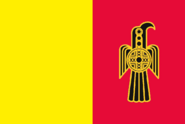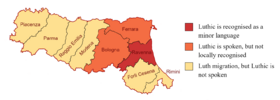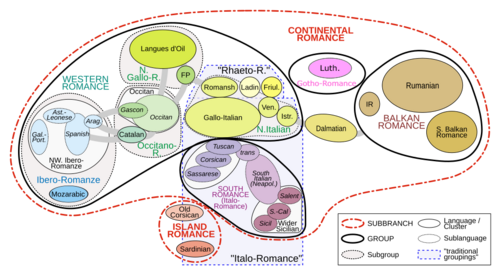Luthic: Difference between revisions
Lëtzelúcia (talk | contribs) (Classification is done, not sure if I inserted the thumb properly) |
Lëtzelúcia (talk | contribs) m (typo) |
||
| Line 42: | Line 42: | ||
Among the Romance languages, its classification has always been controversial, for example, it is one of the [[w:Italo-Dalmatian languages|Italo-Dalmatian languages]] and most closely related to [[w:Istriot language|Istriot]] on the one hand and [[w:Tuscan dialect|Tuscan-Italian]] on the other. Some authors include it among the [[w:Gallo-Italic languages|Gallo-Italic languages], and according to others, it is not related to either one. Although both [[w:Ethnologue|Ethnologue]] and [[w:Glottolog|Glottolog]] group Luthic into a new language group, the Gotho-Romance (''opere citato'') family is still somewhat dubious. | Among the Romance languages, its classification has always been controversial, for example, it is one of the [[w:Italo-Dalmatian languages|Italo-Dalmatian languages]] and most closely related to [[w:Istriot language|Istriot]] on the one hand and [[w:Tuscan dialect|Tuscan-Italian]] on the other. Some authors include it among the [[w:Gallo-Italic languages|Gallo-Italic languages], and according to others, it is not related to either one. Although both [[w:Ethnologue|Ethnologue]] and [[w:Glottolog|Glottolog]] group Luthic into a new language group, the Gotho-Romance (''opere citato'') family is still somewhat dubious. | ||
Luthic has been influenced by [[w:Italian language|Italian]], [[w:Frankish language|Frankish]], [[w:Gothic language|Gothic]] and [[w:Lombardic language|Langobardic]] since its first attestation, the great influence of these languages on the vocabulary and grammar of Modern Luthic is widely acknowledged. Most specialists in [[w:Language contact|language contact] do consider Luthic to be a [[w:Mixed language|true mixed language]]. Luthic is classified as a Romance langauge because it shares innovations with other Romance languages such as Italian, French and Spanish. | Luthic has been influenced by [[w:Italian language|Italian]], [[w:Frankish language|Frankish]], [[w:Gothic language|Gothic]] and [[w:Lombardic language|Langobardic]] since its first attestation, the great influence of these languages on the vocabulary and grammar of Modern Luthic is widely acknowledged. Most specialists in [[w:Language contact|language contact]] do consider Luthic to be a [[w:Mixed language|true mixed language]]. Luthic is classified as a Romance langauge because it shares innovations with other Romance languages such as Italian, French and Spanish. | ||
Revision as of 22:23, 2 March 2024
| Luthic | |
|---|---|
| Lûthica | |
 Flag of the Luthic-speaking Ravenna | |
| Pronunciation | [ˈlu.tʰi.xɐ] |
| Created by | Lëtzelúcia |
| Date | 2023 |
| Native to | Ravenna; Ferrara and Bologna |
| Ethnicity | Luths |
| Native speakers | 149,500 (2020) |
Indo-European
| |
| Official status | |
Recognised minority language in | Italy (recognised by the Luthic Community of Ravenna) |
| Regulated by | Council for the Luthic Language |
The areas where Luthic (red and orange) is spoken. | |
Luthic (/ˈluːθ.ɪk/ LOOTH-ik, less often /ˈlʌθ.ɪk/ LUTH-ik, also Luthish; endonym: Lûthica [ˈlu.tʰi.xɐ] or Rasda Lûthica [ˈʁaz.dɐ ˈlu.tʰi.xɐ]) is an Italic language that is spoken by the Luths, with strong East Germanic influence. Unlike other Romance languages, such as Portuguese, Spanish, Catalan, Occitan and French, Luthic has a large inherited vocabulary from East Germanic, instead of only proper names that survived in historical accounts, and loanwords. About 250,000 people speak Luthic worldwide.
Luthic is the result of a prolonged contact among members of both regions after the Gothic raids towards the Roman Empire began, together with the later West Germanic merchants’ travels to and from the Western Roman Empire. These connections and the conquest by the Germanic tribes of the Roman Empire slowly formed a creole for mutual communication.
As a standard form of the Gotho-Romance language, Luthic has similarities with other Italo-Dalmatian languages, Western Romance languages and Sardinian. The status of Luthic as the regional language of Ravenna and the existence there of a regulatory body have removed Luthic, at least in part, from the domain of Standard Italian, its traditional Dachsprache. It is also related to the Florentine dialect spoken by the Italians in the Italian city of Florence and its immediate surroundings.
Luthic is an inflected fusional language, with four cases for nouns, pronouns, and adjectives (nominative, accusative, genitive, dative); three genders (masculine, feminine, neuter); and two numbers (singular, plural).
Classification
Luthic is an Indo-European language that belongs to the Gotho-Romance group of the Italic languages, however Luthic has great Germanic influence; where the Germanic languages are traditionally subdivided into three branches: North Germanic, East Germanic, and West Germanic. The first of these branches survives in modern Danish, Swedish, Norwegian, Elfdalian, Faroese, and Icelandic, all of which are descended from Old Norse. The East Germanic languages are now extinct, and Gothic is the only language in this branch which survives in written texts; Luthic is the only surviving Indo-European language with extensive East Germanic derived vocabulary. The West Germanic languages, however, have undergone extensive dialectal subdivision and are now represented in modern languages such as English, German, Dutch, Yiddish, Afrikaans, and others.
Among the Romance languages, its classification has always been controversial, for example, it is one of the Italo-Dalmatian languages and most closely related to Istriot on the one hand and Tuscan-Italian on the other. Some authors include it among the [[w:Gallo-Italic languages|Gallo-Italic languages], and according to others, it is not related to either one. Although both Ethnologue and Glottolog group Luthic into a new language group, the Gotho-Romance (opere citato) family is still somewhat dubious.
Luthic has been influenced by Italian, Frankish, Gothic and Langobardic since its first attestation, the great influence of these languages on the vocabulary and grammar of Modern Luthic is widely acknowledged. Most specialists in language contact do consider Luthic to be a true mixed language. Luthic is classified as a Romance langauge because it shares innovations with other Romance languages such as Italian, French and Spanish.

